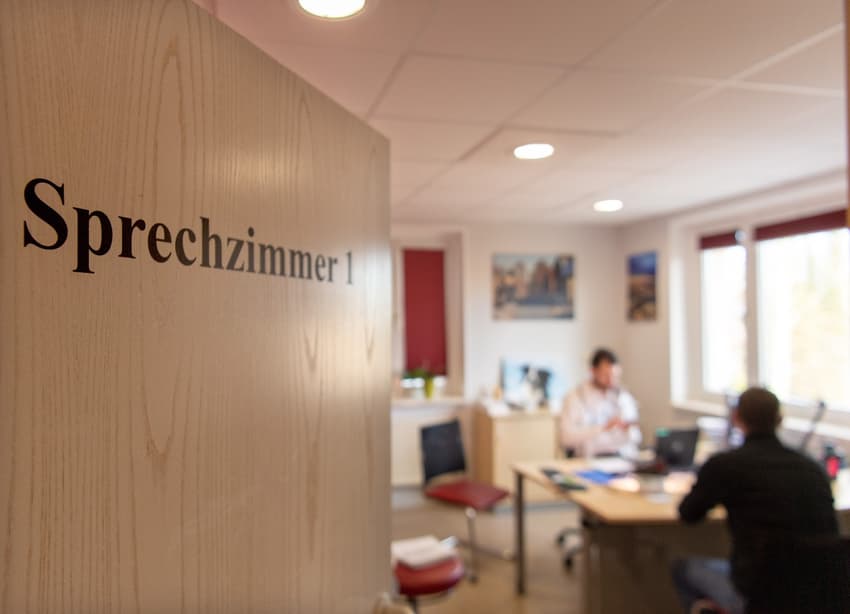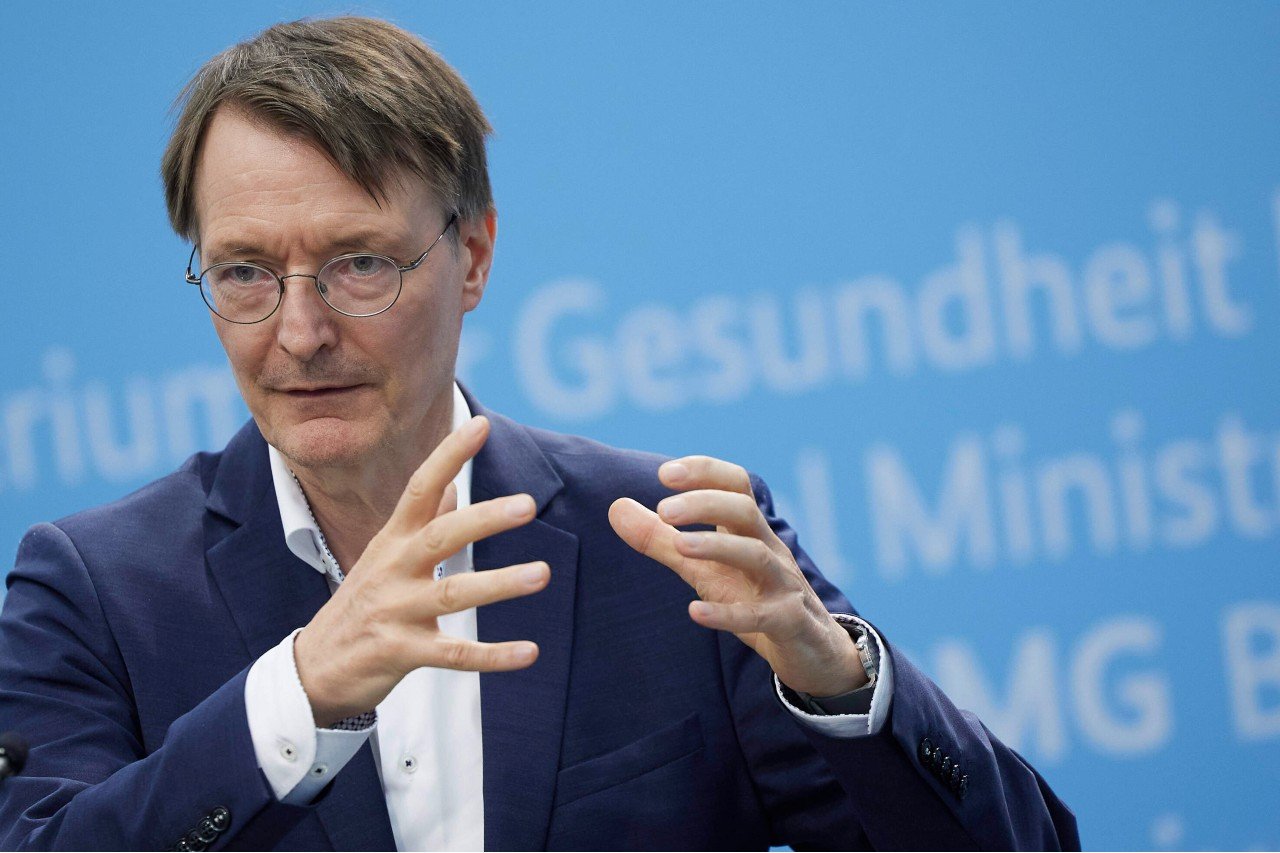KEY POINTS: How could Germany solve its worsening GP crisis?

Patients around Germany are struggling to find doctor's appointments - and experts warn the problem could get worse. Here's what the government wants to do about it.
It was a bleak prognosis from Health Minister Karl Lauterbach (SPD) when he spoke to reporters at a press conference back in March: "In the ten to fifteen years... in many areas of Germany, we won't have enough GPs. We simply won't be able to find a GP... because the GPs won't be there."
The SPD politician was presenting his plans to reform local doctors' practices and make the profession a more attractive option for future generations - plans that have just been voted through by the cabinet.
Germany already has a severe shortage of GPs, Lauterbach explained, but the deficit will only increase as more qualified doctors head into retirement and too few medical students decide to become GPs.
According to the National Association of Statutory Health Insurance Physicians, 37 percent of practising GPs in Germany are currently over the age of 60. This has prompted fears that a significant proportion of doctors could soon retire, leaving a struggling system at the brink of collapse.
With his Care Reinforcement Act, the minister hopes to create enough incentives to boost the numbers of doctors in local surgeries, stem the wave of retirements and shore up the provision of care for the wider population.
READ ALSO: German ministers greenlight plan to improve healthcare at GPs
A paired-down version of the draft was voted through by cabinet ministers on Wednesday morning.
These are the key proposals included in the draft - and the more controversial ones that have so far been left out.
Better remuneration
For GPs - as is already the case for paediatricians - the current cap on remuneration will be lifted. This guarantees that doctors in local surgeries will receive payment for additional work carried out, even if the budget is exhausted.
According to the ministry's estimates, this is likely to result in additional costs in the ‘lower three-digit million range’ for the statutory health insurance funds.
Less bureaucracy
A cornerstone of the plan is to remove the need for unnecessary appointments, for example for repeat prescriptions and sick notes for chronically ill patients.
A standardised 'annual care flat rate' for patients with chronic illnesses would mean that GPs were remunerated for care without requiring these patients to come into the practice for in-person appointments. Instead, they could be issued with e-prescriptions and pick up their medication without needing to see a doctor.
READ ALSO: 10 key things you need to know about healthcare in Germany
More digitalisation
Lauterbach has repeatedly emphasised the need for more digitalisation in the healthcare space, for example via e-prescriptions and digital medical records.
Practices will also be encouraged to offer online services such as telehealth in order to cut waiting times and prevent overcrowded waiting rooms. However, doctors have criticised the draft for not setting out concrete requirements.

A patient picks up a digital prescription at a pharmacy in Germany using their health insurance card. Photo: picture alliance/dpa/AKNR/IMAGO/Steffen Schellhorn | Steffen Schellhorn
Bonuses and incentives
Doctors who offer services to the wider community, for example by offering home visits and weekend appointments, will receive financial incentives to do so.
However, the specific criteria for qualifying for these bonuses has yet to be defined.
Medical care centres
To improve access to care in communities, the government wants to make it easier for local authorities to set up so-called Medical Care Centres (MVZ), for example by assisting with security deposits.
These centres bring together numerous doctors with an array of expertise to offer comprehensive and cooperative care to patients. The model is based on a similar scheme in the former GDR and differs from smaller, specialised practices where GPs are self-employed.
Services for young people
According to the draft, psychological and therapeutic services for children and adolescents should be improved. This group of patients will be planned for separately to ensure adequate access to services.
READ ALSO: How to find available therapists in Germany
Increased transparency
Patients with statutory or long-term care insurance should soon have access to a comparison portal that gives them an overview of the service offered by various insurance funds.
For example, figures on authorisations, refusals and objections to certain health insurance benefits - but also on processing times and the quality of advice and support services - will be available to view online.

Health Minister Karl Lauterbach (SPD) explains his hospital reform plans at a press conference in Berlin. Photo: picture alliance/dpa | Jörg Carstensen
What isn't included in the latest draft law?
In order to make progress in passing his reforms, Lauterbach removed some proposals from the draft that had faced opposition in cabinet.
These include plans to set up ‘health kiosks’ - in other words, easily accessible advice centres for treatment and prevention in areas with a high proportion of disadvantaged households.
Lauterbach also wants to campaign to end statutory health insurance funding for homeopathic treatments. Since the treatments don't work, he argued, the health insurance funds should not be obliged to pay for them.
READ ALSO: Germany's long-standing love affair with homeopathy
With reporting by DPA
Comments (1)
See Also
It was a bleak prognosis from Health Minister Karl Lauterbach (SPD) when he spoke to reporters at a press conference back in March: "In the ten to fifteen years... in many areas of Germany, we won't have enough GPs. We simply won't be able to find a GP... because the GPs won't be there."
The SPD politician was presenting his plans to reform local doctors' practices and make the profession a more attractive option for future generations - plans that have just been voted through by the cabinet.
Germany already has a severe shortage of GPs, Lauterbach explained, but the deficit will only increase as more qualified doctors head into retirement and too few medical students decide to become GPs.
According to the National Association of Statutory Health Insurance Physicians, 37 percent of practising GPs in Germany are currently over the age of 60. This has prompted fears that a significant proportion of doctors could soon retire, leaving a struggling system at the brink of collapse.
With his Care Reinforcement Act, the minister hopes to create enough incentives to boost the numbers of doctors in local surgeries, stem the wave of retirements and shore up the provision of care for the wider population.
READ ALSO: German ministers greenlight plan to improve healthcare at GPs
A paired-down version of the draft was voted through by cabinet ministers on Wednesday morning.
These are the key proposals included in the draft - and the more controversial ones that have so far been left out.
Better remuneration
For GPs - as is already the case for paediatricians - the current cap on remuneration will be lifted. This guarantees that doctors in local surgeries will receive payment for additional work carried out, even if the budget is exhausted.
According to the ministry's estimates, this is likely to result in additional costs in the ‘lower three-digit million range’ for the statutory health insurance funds.
Less bureaucracy
A cornerstone of the plan is to remove the need for unnecessary appointments, for example for repeat prescriptions and sick notes for chronically ill patients.
A standardised 'annual care flat rate' for patients with chronic illnesses would mean that GPs were remunerated for care without requiring these patients to come into the practice for in-person appointments. Instead, they could be issued with e-prescriptions and pick up their medication without needing to see a doctor.
READ ALSO: 10 key things you need to know about healthcare in Germany
More digitalisation
Lauterbach has repeatedly emphasised the need for more digitalisation in the healthcare space, for example via e-prescriptions and digital medical records.
Practices will also be encouraged to offer online services such as telehealth in order to cut waiting times and prevent overcrowded waiting rooms. However, doctors have criticised the draft for not setting out concrete requirements.

Bonuses and incentives
Doctors who offer services to the wider community, for example by offering home visits and weekend appointments, will receive financial incentives to do so.
However, the specific criteria for qualifying for these bonuses has yet to be defined.
Medical care centres
To improve access to care in communities, the government wants to make it easier for local authorities to set up so-called Medical Care Centres (MVZ), for example by assisting with security deposits.
These centres bring together numerous doctors with an array of expertise to offer comprehensive and cooperative care to patients. The model is based on a similar scheme in the former GDR and differs from smaller, specialised practices where GPs are self-employed.
Services for young people
According to the draft, psychological and therapeutic services for children and adolescents should be improved. This group of patients will be planned for separately to ensure adequate access to services.
READ ALSO: How to find available therapists in Germany
Increased transparency
Patients with statutory or long-term care insurance should soon have access to a comparison portal that gives them an overview of the service offered by various insurance funds.
For example, figures on authorisations, refusals and objections to certain health insurance benefits - but also on processing times and the quality of advice and support services - will be available to view online.

What isn't included in the latest draft law?
In order to make progress in passing his reforms, Lauterbach removed some proposals from the draft that had faced opposition in cabinet.
These include plans to set up ‘health kiosks’ - in other words, easily accessible advice centres for treatment and prevention in areas with a high proportion of disadvantaged households.
Lauterbach also wants to campaign to end statutory health insurance funding for homeopathic treatments. Since the treatments don't work, he argued, the health insurance funds should not be obliged to pay for them.
READ ALSO: Germany's long-standing love affair with homeopathy
With reporting by DPA
Join the conversation in our comments section below. Share your own views and experience and if you have a question or suggestion for our journalists then email us at [email protected].
Please keep comments civil, constructive and on topic – and make sure to read our terms of use before getting involved.
Please log in here to leave a comment.